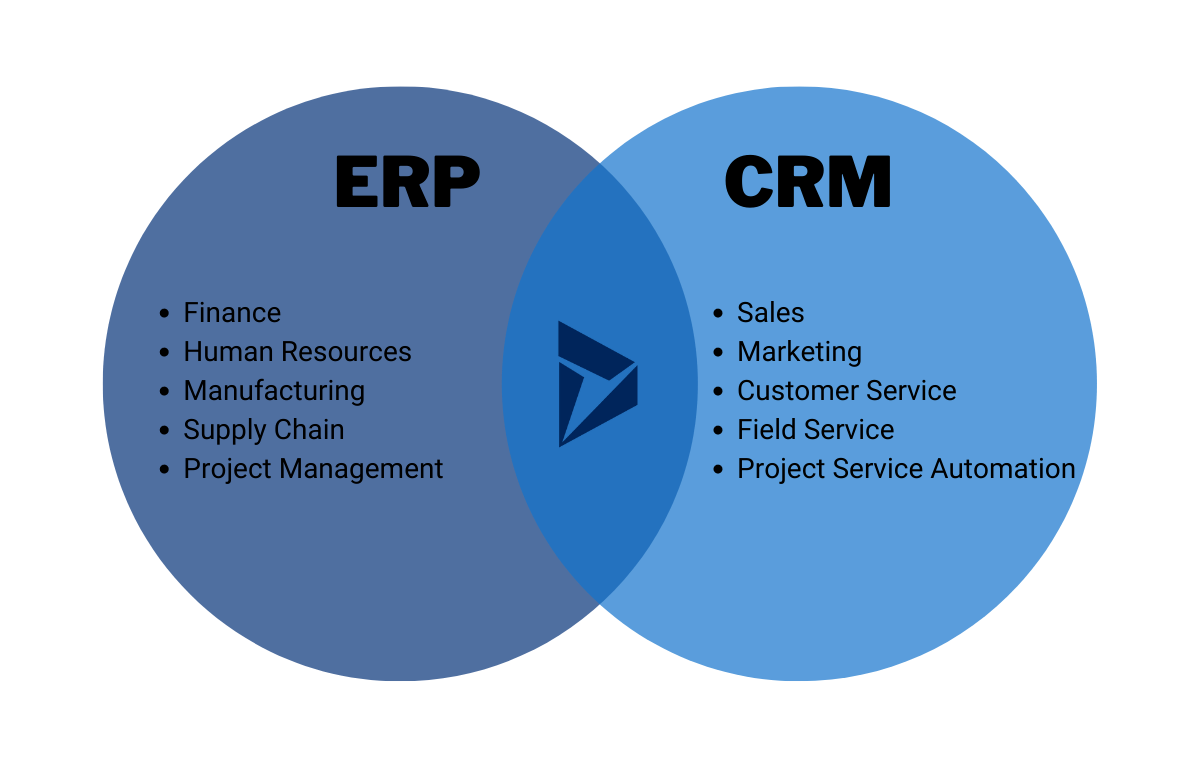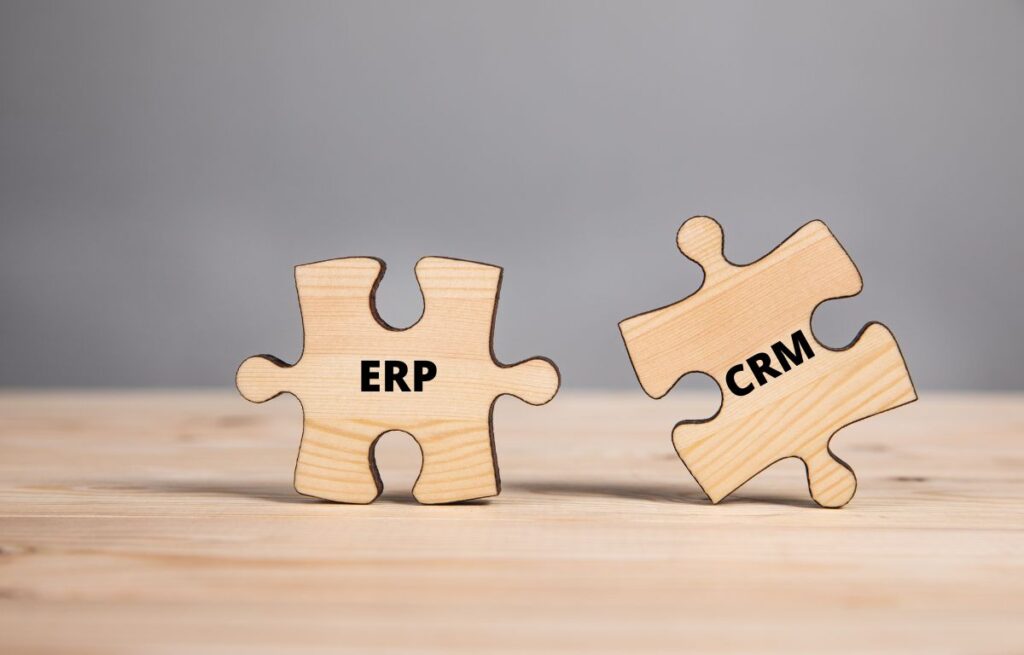Choosing between ERP and CRM software can feel like navigating a maze, especially when you’re trying to figure out which one aligns with your business goals. What is the difference between ERP and CRM? How do they improve your day-to-day operations?
If your team is juggling spreadsheets, disconnected tools, or repetitive manual tasks like invoicing or customer follow-ups, you’re likely missing the advantages of a more integrated system.
That’s where ERP and CRM systems come in.
ERP software centralizes and automates your internal operations, such as finance, inventory, and HR, while CRM software helps you manage leads, track sales activity, and build stronger customer relationships. Each solves a different part of the efficiency puzzle, and together they can dramatically improve how your business runs.
This guide breaks down the key differences between ERP and CRM software, explains when you need one (or both), and helps you decide which is right for your business.
Quick Comparison: ERP vs. CRM:
| Feature | ERP System | CRM System |
| Core Function | Manages internal operations | Manages customer interactions |
| Modules | Finance, HR, Manufacturing, Supply Chain | Sales, Marketing, Customer Support |
| Best For | Process-heavy businesses | Sales-driven businesses |
| Example Software | Dynamics 365 Finance, SAP, Oracle NetSuite | Dynamics 365 Sales, Salesforce |
| Price Point | Typically higher due to broader functionality | More affordable for smaller teams |

Dynamics 365 ERP has an integrated CRM software called Dynamics 365 Sales.
What is ERP?
Enterprise Resource Planning (ERP) software connects and automates your core business processes. From accounting and supply chain to human resources and manufacturing, ERP centralizes everything into one integrated system.
ERP is ideal for growing companies that need to scale efficiently, minimize manual work, and ensure accurate data across all departments.
What is CRM?
Customer Relationship Management (CRM) software helps you manage your interactions with customers and prospects. With CRM, you can:
- Track leads and opportunities
- Monitor customer behavior
- Automate marketing campaigns
- Collaborate across sales and service teams
CRM gives you visibility into your sales pipeline and helps improve customer retention and satisfaction.
Why Not Both? Dynamics 365 Offers Integrated ERP + CRM
If you’re running a business, you know that having an effective and efficient customer relationship management (CRM) system is crucial to success. Likewise, an enterprise resource planning (ERP) system is also essential for businesses. But what if you could get the best of both worlds by choosing an ERP system that comes with integrated CRM?
Microsoft Dynamics 365 stands out because it combines ERP and CRM in one powerful platform. Whether you’re managing finances or closing deals, everything is connected under a single source of truth.
- Dynamics 365 Finance & Operations handles your internal ops.
- Dynamics 365 Sales tracks customers and drives revenue.
This integration means your sales team can see product availability or invoice history without needing to jump into another system. Fewer silos, better service, faster decisions.
Benefits Of Choosing an ERP With Integrated CRM
There are many benefits of choosing ERP with integrated CRM, including:
- Improved data accuracy: Having your CRM and ERP systems in one place means that your data will be more accurate, as there’s only one source to update and maintain.
- More efficient processes: Automate workflows between sales, finance, and operations to reduce manual tasks and delays.
- Better customer service: Having all the information you need about your customers in one place will allow you to provide them with better service.
- Increased sales: Sales teams gain visibility into stock levels, order histories, and support cases, helping them close deals with greater confidence.
- Lower maintenance costs: Managing one unified platform means fewer integrations, easier updates, and less time spent on IT support.
- Simplified employee training: Your employees only need to learn one system, reducing training time, speeding up adoption, and lowering the risk of errors.
These advantages make ERP with integrated CRM a smart, scalable choice for businesses looking to boost efficiency, improve collaboration, and future-proof their operations.
Top 3 CRM & ERP software Solutions (and Why They Stand Out)
If you’re researching the top 3 CRM software or evaluating the best ERP platforms, here are some leading solutions trusted across industries:
Top 3 CRM Software
- Salesforce – Known for its robust customization and large ecosystem, it’s great for scaling sales operations.
- Microsoft Dynamics 365 Sales – Ideal if you’re already in the Microsoft ecosystem; it integrates directly with other Dynamics apps and Microsoft 365.
HubSpot CRM – Offers a user-friendly interface and excellent marketing automation tools for small to mid-sized businesses.
Top 3 ERP Software
- Microsoft Dynamics 365 Finance & Supply Chain Management – A comprehensive ERP solution that scales with your business and integrates CRM natively.
- SAP S/4HANA – A powerful choice for global enterprises, especially in manufacturing, logistics, and finance-heavy industries.
- Oracle NetSuite – Popular with fast-growing businesses looking for a cloud-first, flexible ERP system.
Not sure which one suits your business best? Calsoft’s experts can help you choose and implement the right solution tailored to your goals.
Is Dynamics 365 still a CRM System?
Yes, Microsoft Dynamics 365 still offers robust CRM capabilities, but it’s now part of the broader Dynamics 365 suite.
Originally launched as Microsoft Dynamics CRM, the solution was rebranded in 2016 as Dynamics 365, combining both CRM and ERP functionality under one ecosystem. Today, businesses can manage everything from finance and supply chain to sales, customer service, and marketing, all in a single, integrated environment.
What Is Dynamics 365 Sales?
Dynamics 365 Sales is the modern evolution of Microsoft’s CRM. It enables your sales team to:
- Track accounts and opportunities
- Manage the sales pipeline
- Collaborate across departments
- Forecast revenue and analyze performance
If you’re looking for top-notch CRM and ERP software, you can’t go wrong with Dynamics 365. This software is used by some of the biggest companies in the world, and it offers a comprehensive suite of tools for managing customer relationships. From sales and marketing to customer service and support, Dynamics 365 has everything you need to run your business effectively. And because it’s cloud-based, you can access it from anywhere in the world.
Dynamics for Sales Features:
- Understanding where leads come from and their success rates
- Opportunity and pipeline management
- Sales insights
- Creating prioritization in presales processes
- Creating efficiency, uniformity, and flexibility in your sales processes
- Collaborative selling and internal information sharing
- Understanding win/loss causalities
- Sharing marketing and sales collateral in a completely transparent way
- Understanding and pivoting against all of a customer’s interactions with your business
- Managing inventory based on historical sales data
- Sales insights with forecasts and interactive reports with live data
Conclusion
ERP and CRM systems each solve distinct business challenges, but when combined, they unlock far greater value. While ERP focuses on streamlining internal operations like finance, inventory, and production, CRM helps you strengthen customer relationships, manage your sales pipeline, and improve retention.
With Microsoft Dynamics 365, you don’t have to choose. It brings together the best of both! Integrated ERP and CRM capabilities in one unified, cloud-based platform. Whether you’re looking to scale operations, close deals faster, or improve decisions with real-time data, Dynamics 365 gives you the flexibility and power to support your goals.
Still unsure which solution is right for your business?
Calsoft’s Microsoft-certified experts can help you evaluate your needs and recommend the best path forward—so you can move forward with confidence and clarity.
Contact us today to get started.
Frequently Asked Questions
ERP software manages internal operations like finance, inventory, and HR, while CRM software focuses on managing customer interactions, tracking leads, and improving sales and service performance.
Yes. Many businesses use both, especially when they need to streamline operations and enhance customer relationships. Solutions like Microsoft Dynamics 365 offer integrated ERP and CRM in one platform.
Dynamics 365 is both. It includes ERP applications like Finance and Supply Chain, and CRM applications like Dynamics 365 Sales and Customer Service, all built to work together seamlessly.
Organizations with complex operations and growing sales teams, such as manufacturers, distributors, and service-based companies, see the greatest impact from combining ERP and CRM into a single system.
If you’re focused on streamlining back-office functions like finance and inventory, ERP is essential. If your priority is lead tracking, customer communication, and sales growth, start with CRM. For end-to-end visibility and scale, integrated ERP + CRM is the best solution.
Dynamics 365 Sales can be deployed in the cloud, on-premises, or as a hybrid solution. Most businesses choose the cloud version for flexibility and scalability. Once licensed, users can access Dynamics 365 Sales through the Sales Hub app. If you’re unsure where to start, a Microsoft partner like Calsoft can guide you through setup, configuration, and training.
Ready to Take the Next Step?
Whether you need ERP, CRM, or a fully integrated solution, our Microsoft-certified experts are here to help. We’ll evaluate your business needs and recommend the right Dynamics 365 applications to drive results.

